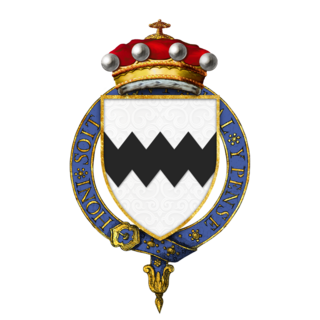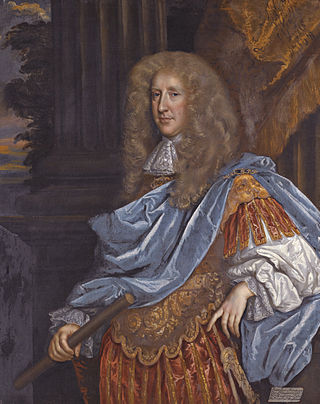Related Research Articles

Thomas West, 8th Baron De La Warr and 5th Baron West, KB, KG was an English courtier and military commander during the reigns of Henry VII and Henry VIII.

Robert Bruce, 1st Earl of Ailesburyand 2nd Earl of Elgin, PC, FRS, was a Scottish politician who sat in the House of Commons from 1660 to 1663, when he inherited his father's title as Earl of Elgin.
Charles Augustus Ellis, 6th Baron Howard de Walden and 2nd Baron Seaford, was a British diplomat and politician.
Admiral Sir James Wallace was an officer of the Royal Navy. He served for a time as a colonial governor.

Lawrence Washington was a High Church rector of the Church of England. He was an early ancestor to the Washington family of Virginia, being the paternal great-great-grandfather of U.S. President George Washington.
Sir Nicholas Lawes was a British judge and colonial administrator who served as the governor of Jamaica from 1718 to 1722.

Francis Needham, 1st Earl of Kilmorey, known as Francis Needham until 1818 and as The Viscount Kilmorey from 1818 to 1822, was an Anglo-Irish soldier and Member of Parliament.

Charles Rose Ellis, 1st Baron Seaford was a British politician, sugar planter, and slave holder.

Thomas Evelyn Scott-Ellis, 8th Baron Howard de Walden, 4th Baron Seaford was an English peer, landowner, writer and patron of the arts.
Barking Lodge is a small village in the parish of Saint Thomas close to the south-east coast of Jamaica.

Sir Richard Guildford KG was an English courtier, administrator, politician and military leader who held important positions under King Henry VII.

The Palmes family of Naburn Hall, and the cadet branches of Lindley Hall, North Yorkshire; Ashwell, Rutland; and Carcraig in Ireland, are an ancient English aristocratic family, noted for their adherence to Catholicism.

Sir John Peter Grant, GCMG, KCB,, was a British colonial administrator who served as Lieutenant-Governor of Bengal (1859–1862) and as Governor of Jamaica.
William Bladen (1672–1718) was an English-born Attorney-General in Maryland, in what is now the United States, and briefly Secretary of that Province. He was the father of Thomas Bladen, Governor of Maryland and was the brother of Colonel Martin Bladen, Commissioner of the Board of Trade and Plantations. His nephew was Admiral Edward Hawke, 1st Baron Hawke.
The Aylett family of Virginia was a prominent family in King William County in Colonial Virginia which also supplied several brides to the Washington and Lee families. The family descended from Thomas Aylett (1570-1650) of Hovells, in Coggleshall, Essex, via his son William who became a merchant taylor in London. It was his son William (?1640-1679) who moved to Virginia. Aylett, Virginia is named for the family.

Sir John Talbot of Pepperhill, Boningale, Shropshire, was an English knight and lord of the manors of Albrighton, Shropshire, and Grafton, Worcestershire.
John Drummond (1744–1804) was a British landowner, physician and surgeon associated strongly with Jamaican history. He appears to have had a liberal attitude toward the institute of marriage, with at least five families in Britain and Jamaica. Most documents refer to him simply as John Drummond of Jamaica.
Thomas Batts was an early settler in Virginia and an explorer of western Virginia.
Fulke Rose was a British physician and early colonist of Jamaica. He was one of the principal buyers in Jamaica of slaves taken by the Royal African Company and had extensive land-holdings on the island. He continued to practice medicine in Jamaica and with Hans Sloane attended the former privateer Henry Morgan towards the end of Morgan's life.
Anne Lovelace, 7th Baroness Wentworth was an English peeress.
References
- ↑ "Needham summary time Line". www.nons.co.uk. Needham Family Site. Retrieved 11 June 2019.
- 1 2 "Needham's of Jamaica". nons.co.uk. Needham Family Site. Retrieved 11 June 2019.
- ↑ America and West Indies: September 1677 British History Online
- ↑ Powers, Anne M. "March v. Ellis a bitter family dispute". A Parcel of Ribbons. Anne M Powers. Retrieved 11 June 2019.